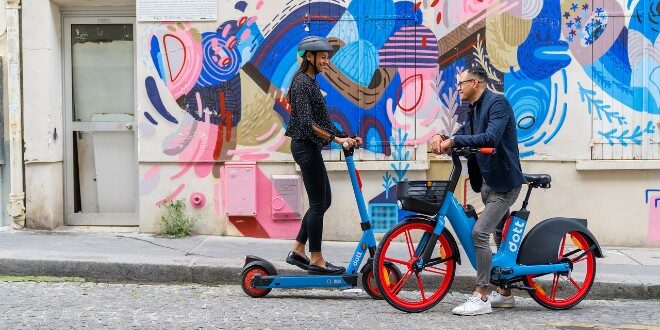Shared micromobility could boost the UK economy by more than £1 billion, according to a new study from Oxford University.
A study by the university’s Oxford Strategy Group, examining services provided by micromobility operator Dott in London, found that there would be huge economic benefits if more people switched to environmentally friendly modes of transport.
With its existing usage, Dott’s shared e-bike and e-scooter service was shown to contribute over £3m to the economy. And if just one in five of London’s 2 billion car trips were made using an environmentally friendly alternative, there would be over £1.1 billion of benefits.
Henri Moissinac, co-founder and CEO of Dott, said: “People are increasingly discovering that shared e-scooters and e-bikes can provide efficient, safe and reliable travel across their cities. This new research shows how choosing sustainable transport can benefit the wider economy as well. To unlock this potential, policy makers should take steps to make it easier for more people to switch to environmentally friendly alternatives.”
Researchers calculated the direct economic contributions of Dott’s service in London, including wages, operations and spending on equipment. This was combined with indirect economic impacts, consisting of:
- Congestion savings of £672m, by all road users from reduced congestion on the streets if one in five London car journeys switched to e-bikes or e-scooters.
- Time savings equivalent to £22m, if 1 in 5 London car journeys (400 million) were switched to a Dott e-bike or e-scooter. Based on 4.7 million hours of potential time savings from switching to more efficient travel across the city.
- Health savings of £371m based on reduced pollution levels from car trips replaced by Dott if 1 in 5 car journeys were swapped.
Dott said these economic benefits could be unlocked by encouraging more people to switch to e-bike and e-scooter services.
Read more: Bolt unveils industry first ‘reckless rider score’
The brand added that major cities across Europe show that the most successful shared schemes include a consistent experience across the city, high density of parking spots, limited no-go and slow zones and high quality infrastructure such as segregated cycle lanes.
 micromobilitybiz Delivering news updates to the micromobility industry, focusing on e-bikes, e-scooters and green transport
micromobilitybiz Delivering news updates to the micromobility industry, focusing on e-bikes, e-scooters and green transport




